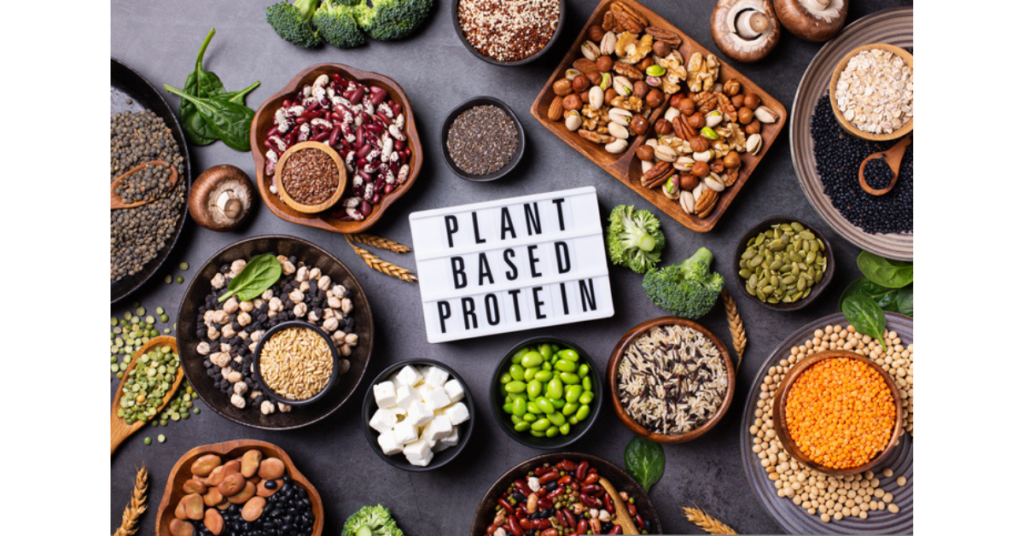Can You Lose Weight Eating Plant-Based?

Introduction
Plant-based diets have become popular in recent years. These diets are not only favoured by vegans but also by people trying to lose weight.
Adopting a diet without animal products is famous for weight loss. It’s a trending topic in the health and wellness industry. More people are choosing this dietary approach due to its proven effectiveness. Its success stories and scientific research support this trend.
A plant-based diet bases itself on eating foods from plants. These include fruits, vegetables, whole grains, legumes, nuts, and seeds. This diet reduces or removes animal products. Health experts have praised this dietary shift. It promotes weight loss and offers many health benefits.
Plant-based diets are gaining traction as effective weight-loss strategies. One key reason is their low-calorie and high-fibre content.
Eat more fruits and vegetables in your meals. Fruits and veggies will make you feel satisfied with fewer calories consumed. Additionally, the fibre in it helps with digestion and makes you feel full. Fibre can reduce the chance of overeating because it regulates digestion.
Plant-based diets also have essential nutrients that support health. These include vitamins, minerals, antioxidants, and phytochemicals. Nutrient-dense foods help with weight management. They also improve cardiovascular health and reduce the risk of chronic diseases. These diseases include diabetes and certain types of cancer.
A plant-based diet has advantages for weight loss. One advantage is its potential impact on metabolism. Plant-based foods are lower in saturated fats compared to animal products. Improving insulin sensitivity in your body and regulating blood sugar levels are crucial. They lead to a healthy weight.
Furthermore, individuals who opt for a plant-based diet often discover tasty recipes. These recipes include a variety of flavours from fruits, vegetables, and herbs.
And spices. This variety keeps meals interesting and encourages long-term adherence to the diet.
The popularity of plant-based diets for weight loss is increasing. Promising results drive this and offer many benefits. A plant-based diet can promote weight loss through low-calorie, high-fibre foods. It also has a positive impact on health and metabolism. This diet helps with weight loss and is sustainable. It also promotes compassion and environmental friendliness.
The Science Behind Plant-Based Weight Loss: How Does it Work?
Weight Loss on a Plant-Based Diet

Plant-based weight loss is a captivating science that has garnered attention. It has gained significant traction in recent years. Many people are adopting a plant-based diet for weight loss. These individuals hope to improve their health by doing so. But how does it work?
Plant-Based Diet and Metabolism
One of the factors in weight loss on a plant-based diet is its impact on metabolism. Plant-based foods generally have fewer calories and more fibre than animal products. This combination can increase metabolism. It does this by boosting the thermic effect of food. The thermic effect found in food is the energy used for digestion.
Plant-Based Diet and Calorie Intake
Plant-based diets can lower calorie intake. They are filling and low in calories. Additionally, they help control food portion sizes. Individuals can eat more plant-based foods and fewer animal-based foods. It allows them to consume fewer calories. Reducing calorie intake helps the body use stored fat for energy. This reduction of calories leads to weight loss.
Impact of Plant-Based Foods on Body Composition
Furthermore, the composition of plant-based foods can impact body composition. Typically, these foods are rich in complex carbohydrates and fibre. They also contain essential nutrients but are low in saturated fats and cholesterol. This nutrient-rich quality promotes fullness and supplies vital nutrients for weight loss. The body benefits from this nutrient-rich quality during weight loss.
Adopting a plant-based diet for weight loss has many benefits. This diet impacts metabolism, reduces calorie intake, and improves body composition. Individual results may vary based on dietary choices, activity level, and genes. Consult a doctor or nutrition expert for your nutritional requirements.
Embarking on a plant-based weight loss journey can transform your health. It can also benefit the environment at the same time. It’s essential to understand the key components. These components contribute to a successful and sustainable outcome. Incorporate crucial elements into your plan. Maximize chances of achieving weight loss goals. Nourish your body with wholesome plant-based foods.
One crucial component is practical plant-based meal planning. Creating well-balanced meals involves selecting nutrient-dense food sources. These sources include fruits, vegetables, whole grains, legumes, and plant-based proteins. Plan your meals ahead of time. Planning ensures a variety of delicious options are available. Avoid impulsive food choices.
Another vital aspect of a plant-based diet is portion control. Whole foods have fewer calories than processed foods, but portion size matters. Monitoring portion control helps prevent overeating. It ensures you consume appropriate calories for weight loss. It also provides necessary nutrients to your body.
Understanding the importance of protein is essential for a plant-based weight loss plan. Additionally, it is crucial to comprehend this. Protein facilitates the building and repairing of tissues. It also supports muscle growth and promotes feeling full. Including tofu, tempeh, legumes, quinoa, and nuts in your meals is essential. They are high-quality plant-based protein sources. Eating them helps maintain muscle mass while losing weight and keeps you satisfied.
Incorporating whole foods into your diet is critical for long-term success. Whole foods are essential for a plant-based weight loss journey.
Whole foods are not highly processed or unprocessed. These foods still contain their natural nutrients and fibre. Focusing on fruits, vegetables, whole grains, and nuts/seeds is essential. Avoid relying on processed vegan alternatives or refined carbohydrates. Whole food plant-based will provide ample nutrition and support healthy digestion.
Embrace effective meal planning to lay a solid foundation. Practice portion control for a successful plant-based weight loss journey. Focus on adequate protein intake to support your weight loss goals. Emphasize whole, unprocessed foods for a healthier lifestyle. Remember, the goal is losing weight and nourishing your body. Embrace a sustainable lifestyle that benefits you and the planet.
Busting Myths: Addressing Concerns about Nutritional Deficiencies in Plant-Based Diets
Several common concerns and misconceptions surround the nutritional adequacy of plant-based diets. It is essential to address concerns and bust myths. Scepticism about meeting nutrient requirements on a vegan diet is common. These concerns often contribute to the scepticism.
Nutrient Deficiencies in Veganism
One of the most prevalent concerns is the fear of nutrient deficiencies in veganism. Certain nutrients may be more complex to get from plants alone. It is possible to meet nutrient requirements on a vegan diet. It only requires proper planning and knowledge.
Meeting Nutrient Requirements on a Plant-Based Weight Loss Plan
Protein can be a concern for those on a plant-based weight loss plan. There are many plant-based protein sources. Examples include legumes, tofu, tempeh, seitan, and quinoa. These sources can provide enough protein for optimal health.

Similarly, meeting calcium needs without consuming dairy products is another concern. Plant-based sources can fulfil calcium requirements. We include fortified non-dairy milk alternatives, such as soy or almond milk. Tofu made with calcium sulfate is also available. Include leafy greens, such as kale and broccoli. Fortified orange juice is also an excellent option.
Flaxseeds, hemp seeds, and walnuts are plant sources. They are rich in omega-3 fatty acids. Algae-based supplements also provide omega-3 fatty acids. These fatty acids are critical for our bodies. Iron-rich foods can prevent iron deficiencies. Some examples include lentils, chickpeas, spinach, quinoa, and fortified cereals. These deficiencies point to vegan diets.
We can address meeting nutrient needs on a vegan diet by debunking myths. Providing evidence-backed information is also helpful. You can achieve this through planning and food choices.
Adopting a balanced plant-based weight loss plan reassures individuals. It doesn’t cause nutritional deficiencies.
You’re in luck if you want to maximize your weight loss results with a plant-based diet. This dietary approach offers many health benefits. It can also help with weight loss. Incorporate these tips and tricks into your plant-based journey. These tips will fast-track your journey to achieving your weight loss goals.
First, it’s essential to focus on nutrient-dense plant-based foods. Choose whole grains, legumes, fruits, and vegetables. They contain vitamins, minerals, and fibre. These foods will make you feel full for a longer time. They also contain essential nutrients that will help you lose weight.
Plenty of healthy options are available for those wanting to eat vegan. Choose nutrient-packed alternatives like raw nuts, seeds, and fresh fruit slices. Pair them with nut butter or homemade veggie sticks and hummus. These choices will fulfil your cravings. They will also support your health and weight loss goals.
Regular exercise is crucial for achieving optimal weight loss on a plant-based diet. Engage in effective workout routines. Combine running or cycling for cardio. Add bodyweight or resistance bands for strength training. This combination will boost your metabolism. It will build lean muscle mass while burning calories.
Consistency is crucial when it comes to any weight loss journey. Stick to your diet and exercise plan. Make sure to listen to your body’s needs.
You can achieve optimal weight loss by following these plant-based tips and tricks. You’ll also enjoy many health benefits that come with it.
Conclusion
Embracing the power of plants benefits sustainable weight loss. It also improves well-being.
Adding plant-based foods to our diets has many health benefits. These include better digestion, more energy, and lower risk of chronic diseases.
Plants contain nutrients, fibre, and antioxidants. They support metabolism and weight management. These foods have few calories and fill us up, so we eat less. Researchers have found a connection between plant-based diets and lower BMI. Additionally, they have discovered a decreased risk of obesity.
Incorporating fruits and vegetables into our meals nourishes our bodies. It also supports the health of the planet. Let’s embrace the power of plants. They promote sustainable weight loss and well-being.
